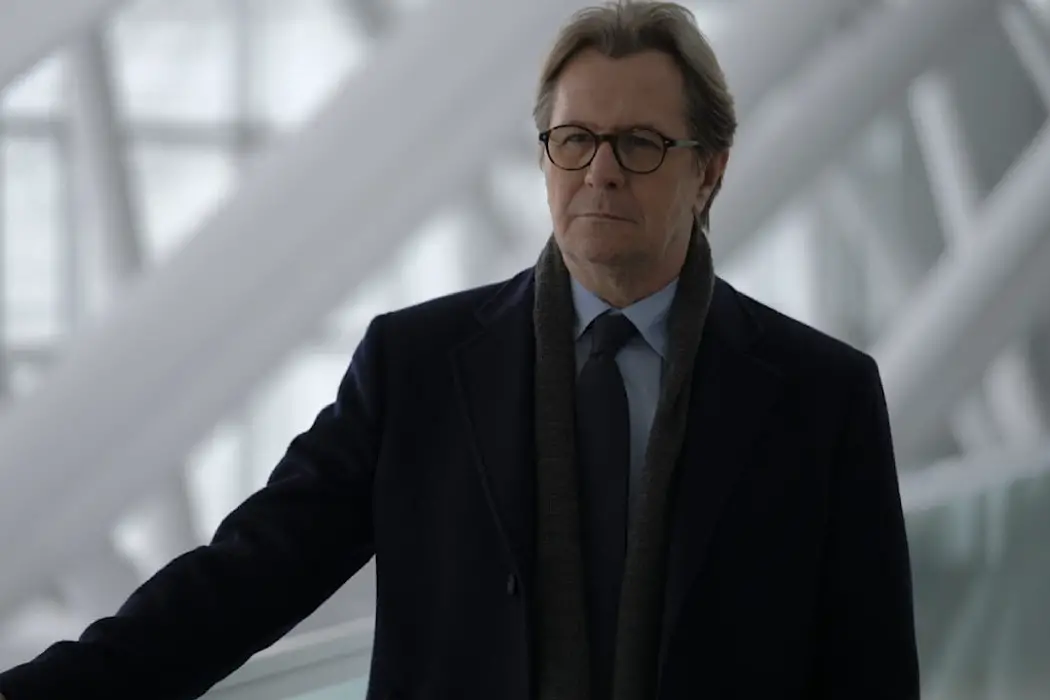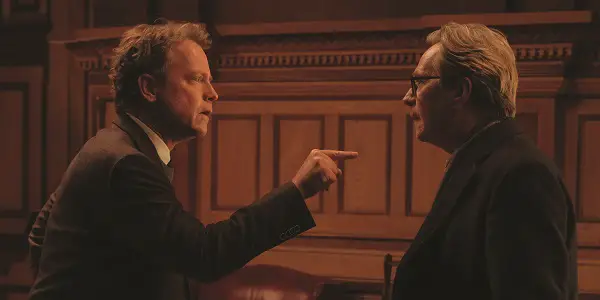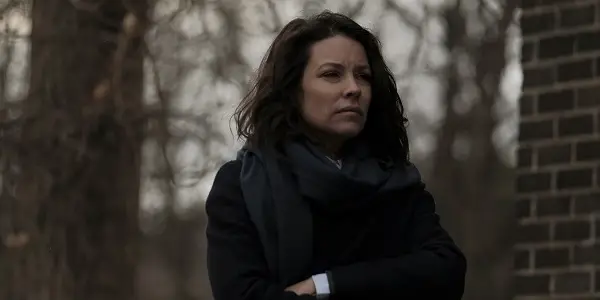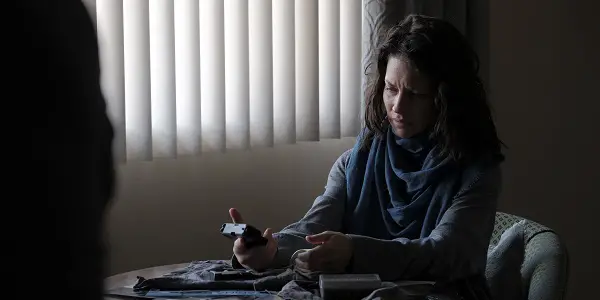CRISIS: An Okay Opiod Anthology

A former video store clerk, Mark has been writing about…
Crisis takes on the tough task of trying to convey the enormity of the opiod epidemic. It’s a problem that goes far beyond one person making a bad choice and is much denser than one pharma company making a bad call. It’s a topic that spans from the smallest consumer to the largest of systems.

While this multi-story film doesn’t quite pack the punch for taking this problem seriously in its scattershot methodology, there’s at least an ample ambition in trying to broaden this picture to be far more than just one genre of drug drama.
Corporate Corruption
The best story is by far the drama of Dr. Tyrone Brower (Gary Oldman) and his drug studies. Brower works at a university where his research centers around testing out a new painkiller for signs of addiction. What he discovers is a horrifying result of his lab mice that brings about an early demise. Concerned, Brower aims to make this info known.
Not as keen to share this information is the pharmaceutical company behind the painkiller. With so much money at stake, the organization offers to pay Brower an extensive amount of hush money for the study to turn up nothing. Should he refuse, however, he will become a target of a campaign to fire and discredit the professor from his position.

This entry is the most compelling mostly due to the fantastic performance of a fervent Oldman who spends most of the film clashing with a university head played with equal fury by Greg Kinnear. They have many bouts over character and morality that hit well for being both blunt and on-target. In a film that features shootouts and intense interrogations, nothing quite beats the bouts of Oldman and Kinnear.
Detective Drama
The story that most audiences may be familiar with when it comes to tackling drugs in movies is that of Officer Jake Kelly. He’s a narcotics officer who plans out an incredibly intricate operation aimed at cartels dealing in Fentanyl. Kelly, aiming to make this investigation fruitful, plans to go in deep into the cartel.
Kelly faces concerns from his superiors with concerns about his personal stake in this game, considering he has a connection with an abuser that he’d do anything for. But even without that baggage, he still finds himself so deep into playing the role of a cartel collaborator that the mission grows more dangerous by the day. All it takes is one slight tell or misplaced operative and everything that could come crashing down. And since this is the most intense entry of the anthology, it wasn’t exactly a surprise to see the operation switch from thriller to action.
Kelly’s story certainly has more of a moody edge than grander contemplation compared to Brower’s tale. There’s certainly a neo-noir appeal to how the conflicted Kelly tries to talk and gun his way out of every obstacle on his path to combating the drug crisis. But the thriller aspects are so par-for-the-course that there’s not much intensity when a drug deal turns into a violent shootout. This entry feels less effective consider it delivers on a familiar aroma of drug-based thrillers to see a tee that it doesn’t leave as much of an impact on the myriad of similar themed run-and-gun pictures.
Personal Tragedy
Finally, there’s the more personal and tragic story of a mother turned vigilante. Having dealt with drugs before, mother Claire Reimann (Evangeline Lilly) is seeking to turn her life around. Everything seems to be going well for her until she is told by the police that her son has died of a drug overdose.
With no help from law enforcement, Claire takes it upon herself to find out what led to her soon becoming such an addict. She tracks her way through social media accounts and treads down a dark trail of drug deals gone bad. Realizing how deep she may be going, Claire invests in a gun that will be wavered with a quiver, unsure if she’s willing to pull the trigger when searching for answers.

Claire’s story is one that feels as though it needs a lot more room to breathe. The feeling of isolation amid grief in such a towering topic is certainly an area worth exploring. Crisis, however, only feels as though it’s covering the bullet points of such a story, trimming down what could’ve been a moody and emotional tale into an edited short.
The Big Picture
With all three stories mixed together, there’s certainly a swirling of tones present with the change in settings, professions, and motivations. Yet there seems to be a little something lost in this scattershot approach, always feeling as though the film cuts away before we can become invested enough in the situation.
It’s a rather frustrating film when considering just how close it comes to something poignant. Just when Oldman delivers a powerful performance and I can’t wait to see what he does next, the camera turns over to a moody police investigation. Just when the sting operation starts to bubble with intrigue, we then cut over to Claire’s somber depression of loss.
This rollercoaster of stories becomes jarring after a time where even when the intent feels known throughout, the intensity never hits as much as it should. There are a handful of scenes that work rather well. From a belligerent exit of a drug den to the academic feudings in stuffy council rooms, these episodic moments always kept me engaged, yet let me down when I knew it was just a minute or two away from diverting to another story.

Perhaps that’s the point of such a picture. Maybe it wants us to be so distracted to gain a sense of how cluttered this situation is that it’s nearly impossible to understand it all within one sitting. There’s something noble about such ambition but it becomes hard to decipher when we’re being serviced up a sliced and diced depiction of drugs that speeds through much of its palpable points.
Conclusion: Crisis
Crisis certainly stirs with insight but also confounds in its anthology construction. There are some fine performances and strong scenes here and there but the editing darts between so many stories that it’s just begging for a fan cut. I can say with some admiration, however, that the film did get my gears turning about how much information there is to consider of the opioid epidemic. I just wish it didn’t require as much sifting through its assembly.
What did you think of Crisis? Did it paint a bigger picture of the drug issues in the world? Let us know in the comments below.
Crisis is currently available on VOD.
Watch Crisis
Does content like this matter to you?
Become a Member and support film journalism. Unlock access to all of Film Inquiry`s great articles. Join a community of like-minded readers who are passionate about cinema - get access to our private members Network, give back to independent filmmakers, and more.
A former video store clerk, Mark has been writing about film for years and hasn't stopped yet. He studied film and animation in college, where he once set a summer goal to watch every film in the Criterion Collection. Mark has written for numerous online publications and self-published books "Pixels to Premieres: A History of Video Game Movies" and "The Best, Worst, Weird Movies of the 1990s."













